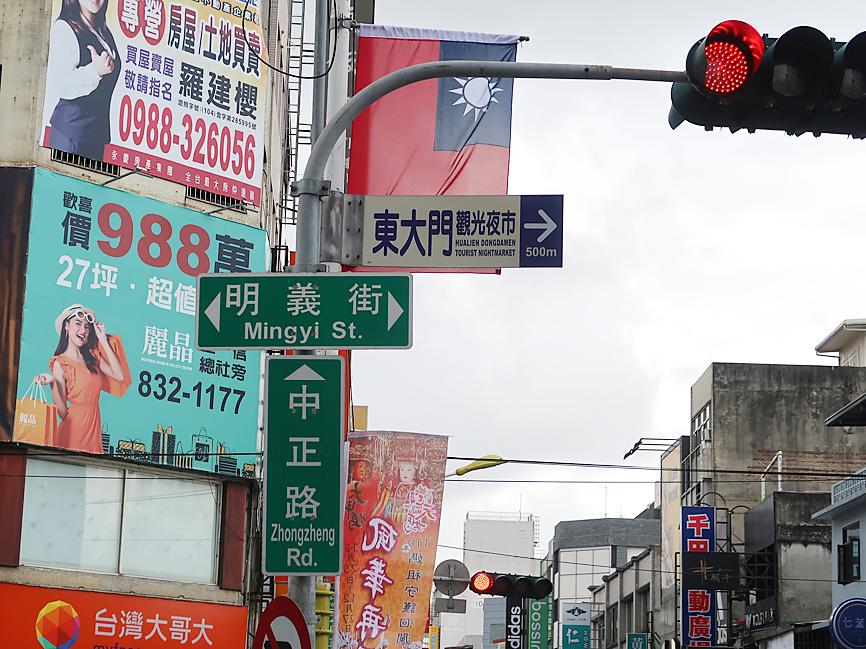More than 350 streets are named after Chiang Kai-shek (蔣介石) or his son Chiang Ching-kuo (蔣經國), due to an edict issued during the nation’s authoritarian era, a study by the Transitional Justice Commission showed.
The survey of the Ministry of the Interior’s records of road names, online search engines and archival material found that 316 roads are named “Jhongjheng” (中正), a name adopted by Chiang Kai-shek, the commission said.
Twenty-eight roads are named “Jieshou” (介壽) — which is an abbreviation of the slogan “long live Chiang Kai-shek” — and 11 are named “Jingguo” (經國) after Chiang Ching-kuo, it added.

Photo: Chen Yu-fu, Taipei Times
The survey was conducted as part of an effort to rename roads that evoke authoritarian slogans and symbols, it said.
The proliferation of streets named after the Chiangs stemmed from a 1945 executive order to rename roads throughout Taiwan, which the then-Chinese Nationalist Party (KMT) regime had taken control of, it said.
The order from the then-Taiwan Provincial Government said that all street names honoring Japanese, the state of Japan or otherwise derived from Japanese were to be changed within two months, the commission said.
The new street names had to represent the “spirit of the Chinese people,” promote the Three Principles of the People, honor a national hero or recognize the geography or customs of an area, the commission cited the order as saying.
Examples of acceptable street names listed in the order included Jhonghua (中華), Sinyi (信義), Heping (和平), Sanmin (三民) and those that utilize the names of Chiang Kai-shek or Republic of China founder Sun Yat-sen (孫逸仙), it said.
The implementation of the order in the two years that followed would form the basis of most street names used today, the commission said.
The post-war push to rename streets was motivated by a desire to replace representations of Japanese colonialism with symbols of Chinese authoritarianism, an effort that was indifferent to the identities and culture of Taiwan’s residents, it said.
Place names play an important role in forming the identity of the community living there, and reflect its cultural and historical context, the commission said, adding that the authoritarian-era names should be replaced.
Citing the Development of National Languages Act (國家語言發展法) and the Indigenous Peoples Basic Act (原住民族基本法), the commission said that new road names should promote the country’s local languages and culture, including those of Aboriginal communities.

A preclearance service to facilitate entry for people traveling to select airports in Japan would be available from Thursday next week to Feb. 25 at Taiwan Taoyuan International Airport, Taoyuan International Airport Corp (TIAC) said on Tuesday. The service was first made available to Taiwanese travelers throughout the winter vacation of 2024 and during the Lunar New Year holiday. In addition to flights to the Japanese cities of Hakodate, Asahikawa, Akita, Sendai, Niigata, Okayama, Takamatsu, Kumamoto and Kagoshima, the service would be available to travelers to Kobe and Oita. The service can be accessed by passengers of 15 flight routes operated by

GIVE AND TAKE: Blood demand continues to rise each year, while fewer young donors are available due to the nation’s falling birthrate, a doctor said Blood donors can redeem points earned from donations to obtain limited edition Formosan black bear travel mugs, the Kaohsiung Blood Center said yesterday, as it announced a goal of stocking 20,000 units of blood prior to the Lunar New Year. The last month of the lunar year is National Blood Donation Month, when local centers seek to stockpile blood for use during the Lunar New Year holiday. The blood demand in southern Taiwan — including Tainan and Kaohsiung, as well as Chiayi, Pingtung, Penghu and Taitung counties — is about 2,000 units per day, the center said. The donation campaign aims to boost

ENHANCING EFFICIENCY: The apron can accommodate 16 airplanes overnight at Taoyuan airport while work on the third runway continues, the transport minister said A new temporary overnight parking apron at Taiwan Taoyuan International Airport is to start operating on Friday next week to boost operational efficiency while the third runway is being constructed, the Ministry of Transportation and Communications said yesterday. The apron — one of the crucial projects in the construction of the third runway — can accommodate 16 aircraft overnight at the nation’s largest international airport, Minister of Transportation and Communications Chen Shih-kai (陳世凱) told reporters while inspecting the new facility yesterday morning. Aside from providing the airport operator with greater flexibility in aircraft parking during the third runway construction,

American climber Alex Honnold is to attempt a free climb of Taipei 101 today at 9am, with traffic closures around the skyscraper. To accommodate the climb attempt and filming, the Taipei Department of Transportation said traffic controls would be enforced around the Taipei 101 area. If weather conditions delay the climb, the restrictions would be pushed back to tomorrow. Traffic controls would be in place today from 7am to 11am around the Taipei 101 area, the department said. Songzhi Road would be fully closed in both directions between Songlian Road and Xinyi Road Sec 5, it said, adding that bidirectional traffic controls would